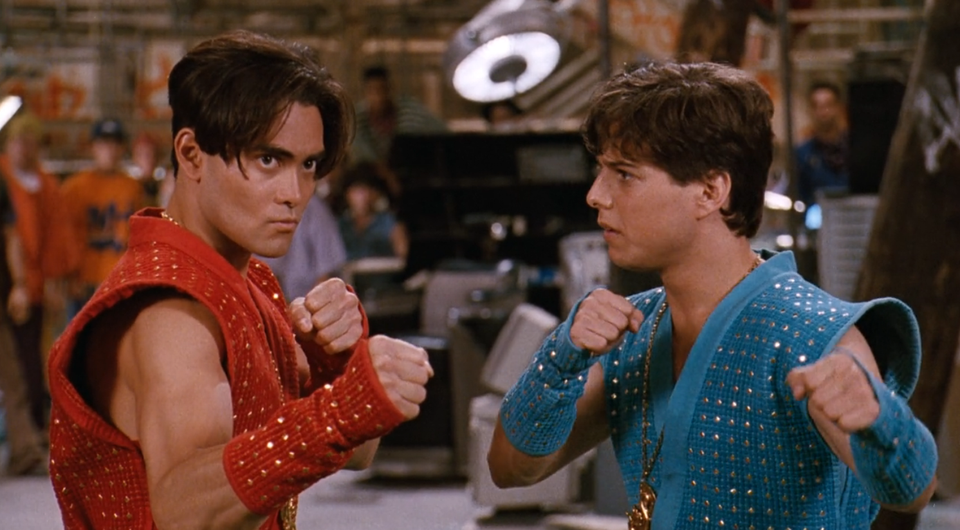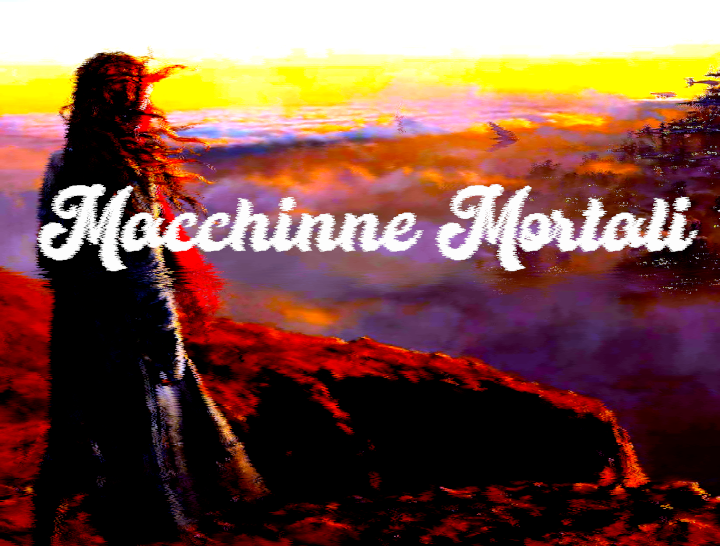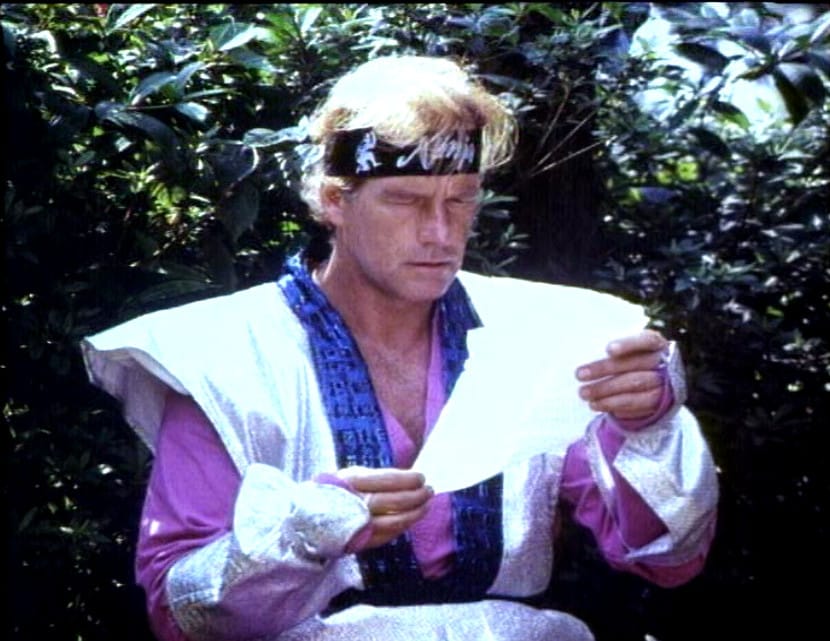WILLY WONKA & THE CHOCOLATE FACTORY (1971)
Powerhouse performances, magical design and unforgettable music combined to make one of the most iconic films of the 1970s.
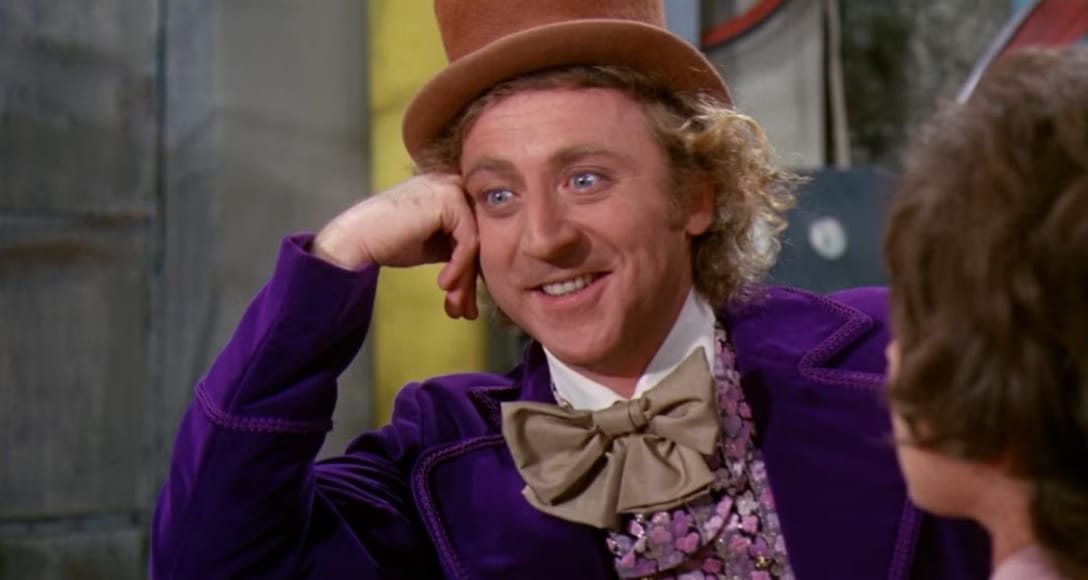
What can you say about this film that hasn't been said in the last 54 years? This movie is one of my favorite 70s (was it in production in the 60s?) movies and it remains as sharp, funny and weird as it ever did. Watching as an adult brings back a lot of nostalgia, sure, because I loved this movie as a kid– my parents hated it. Sorry not sorry for renting it from Blockbuster a million times, mom.
It probably formed (warped?) part of my sense of art, humor, and horror at a very young age– along with Dr. Seuss and Shel Silverstein– but still it stands out from the plethora of boring "actors in a carpeted room talking to each other, looking pretty stoned" 70s films of its time.
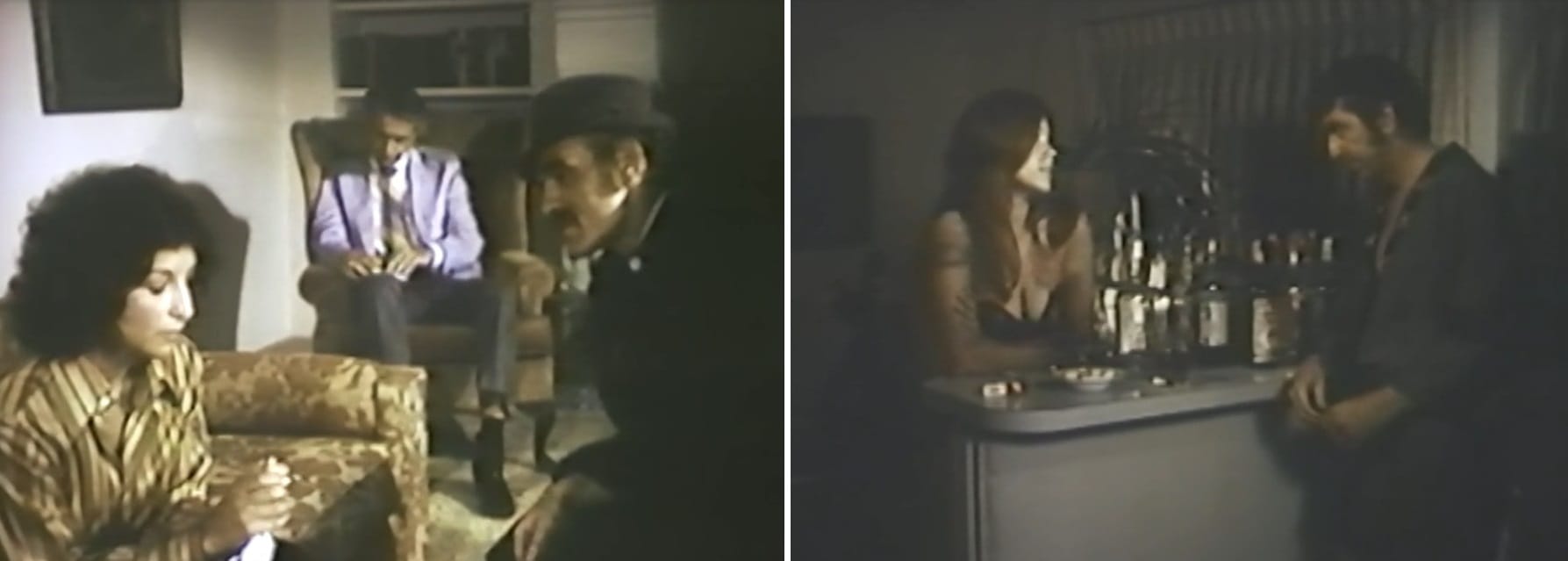
WILLY WONKA AND THE CHOCOLATE FACTORY has been praised for 54 years on just about every metric: music, costumes, sets, script, cast. Who among us doesn't still get a little lift of excitement when Willy Wonka trots down the mind-bending optical illusion hallway...
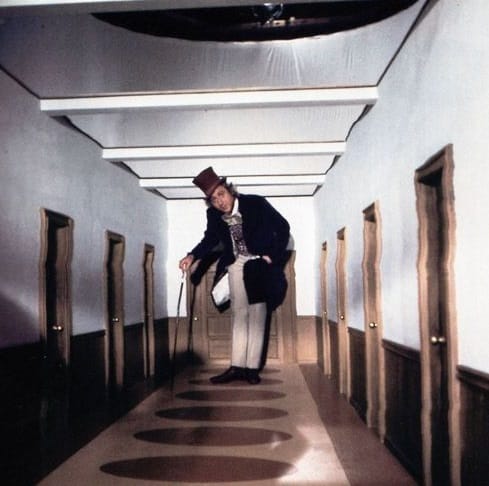
...building mystery and weirdness and suspense, and finally slowly opening the impossibly bigger-on-the-inside door to the gloriously real Chocolate Room?
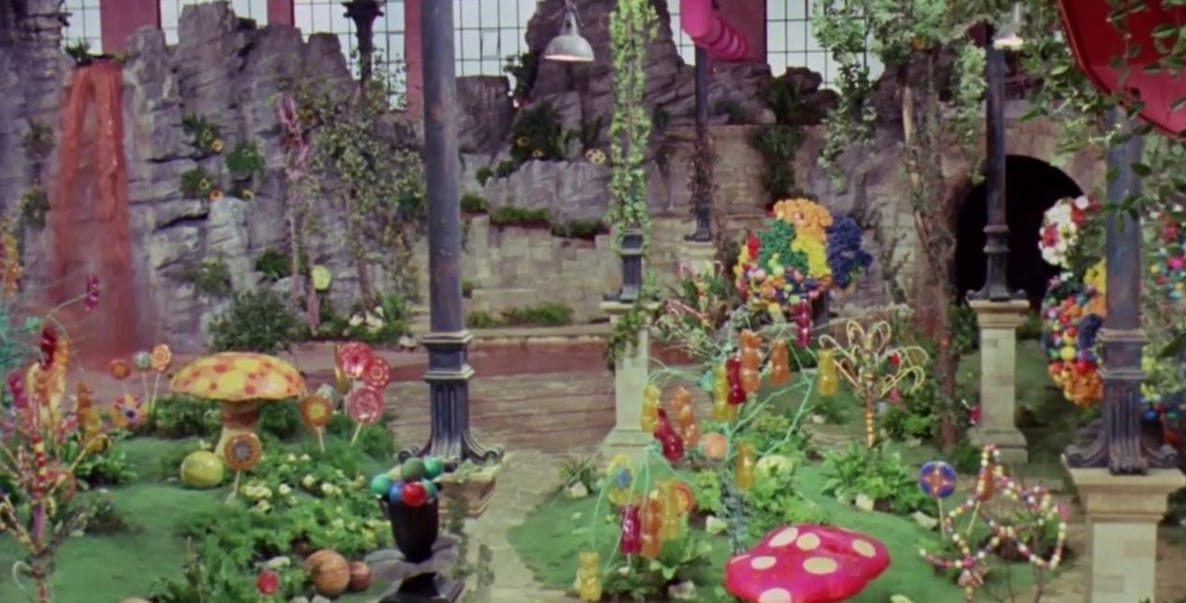
The performances across the board are just stellar. Gene Wilder, of course, burns up the film with his ADHD-dripping, 'sardonic, demonic-edged' portrayal of Willy Wonka– definitely more intense and sarcastic than the book version. He is also very carefully presented to us: notice the way he is styled, with a deep royal-violet coat and vest, but an unexpected brown hat and light taupe-gold bow tie and slacks. This is a complimentary color scheme (violet and yellow), but also serves beautifully to make Wilder's gold hair look golder and his blue eyes bluer. He is wildly overdressed in this 70s European city of brown coats, terra-cotta roofs and cobblestones, but he is also intensely self-confident. Put simply, he owns it. Willy Wonka commands not only the world inside his secret factory ("Nobody ever goes in... and nobody ever comes out!"), he commands the factory guests, the scene, and the viewer. It's 4-D levels of confidence.
The first half of the film (the world searching for the Golden Tickets), re-watching as an adult, is slightly more hilarious than the latter half (moving through the factory) although Wilder's ice-cold wryness still makes me laugh every single time.
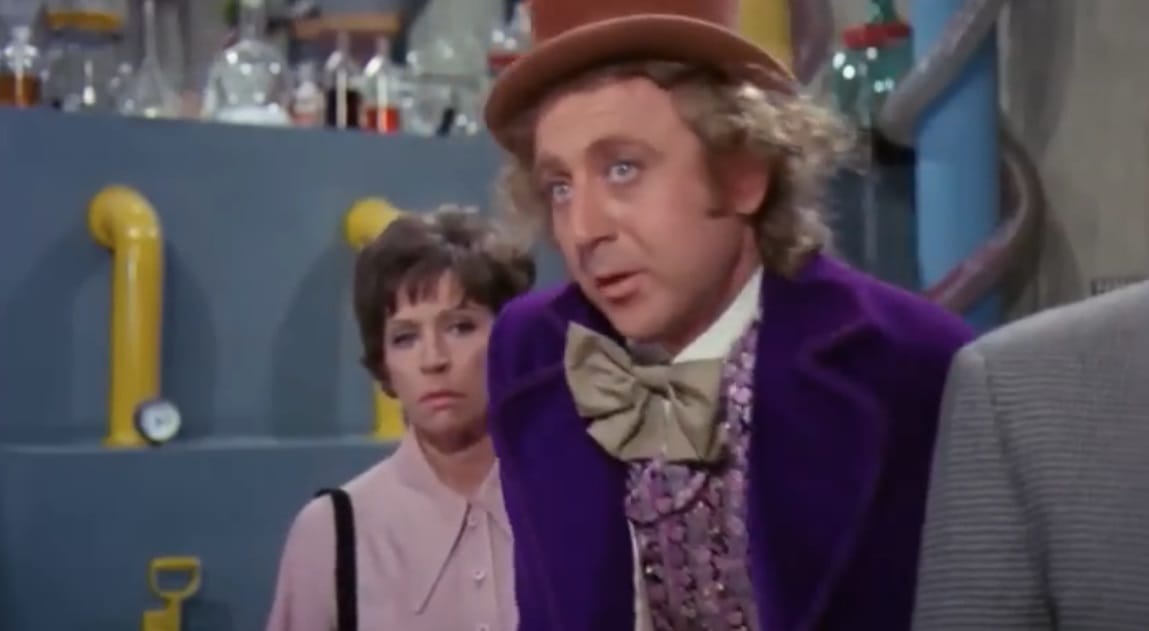
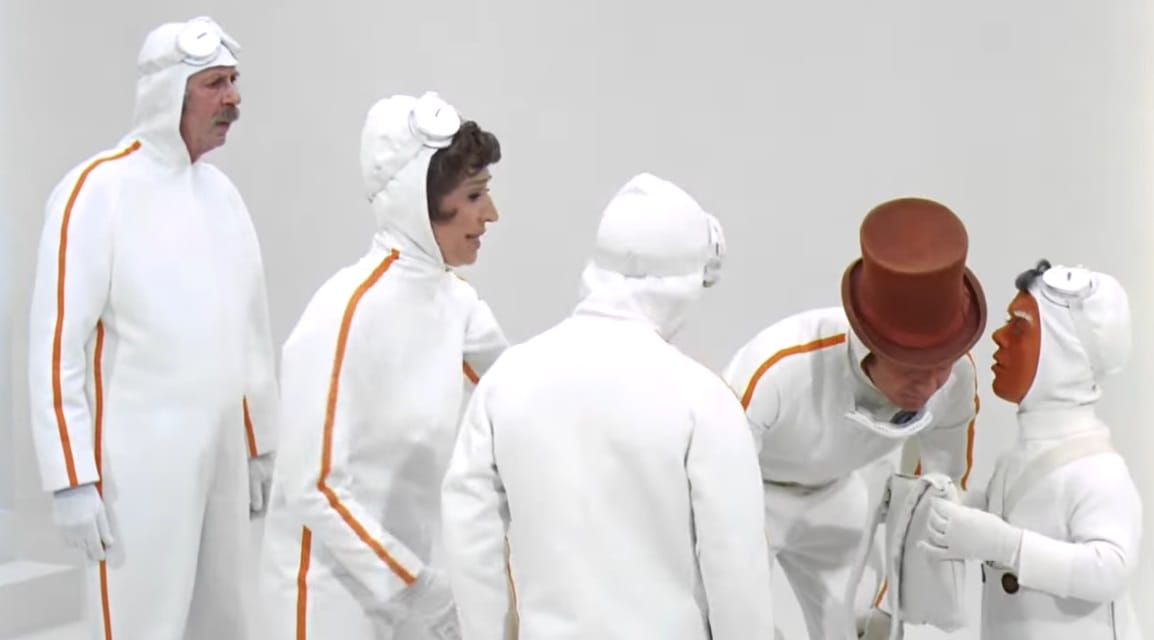
As a kid I didn't appreciate the short scenes of adults losing their ever-loving minds over the Golden Tickets, directed and shot in all different genres– it really flew over my head. But as an adult I'm much more versed in mid-century media and the short segment of the melodramatic wife whose husband is kidnapped ("Do you hear me? It's your case of Wonka bars or your husband's life!"
"...How much time will they give me to think about it?") is laugh-out-loud funny; like actual belly-laugh funny. I've seen it dozens of times and it still catches me off guard.
I also can't help but snicker all the way through the great scene with the "greatest miracle of the machine age." The posh computer programmer, standing sweaty and pressured before a silent trio of investors/government bureaucrats, promises that "Based on the revolutionary Computonian Law of Probability, this machine will tell us the precise location of the three remaining Golden Tickets." ... beep boop... "It says, 'I won't tell, that would be... cheating.'"

Harold "Jack" Albertson (June 16, 1907 – November 25, 1981) was an American actor, comedian, dancer and singer. Albertson was a Tony, Oscar, and Emmy winning actor, which ranks him among the only 24 actors who have been awarded the "Triple Crown of Acting". Is a Tony/Oscar/Emmy-owning actor overkill to play Grandpa Joe– a slightly conniving, slightly eccentric, slightly corrupt, slightly manipulative, but endearing and charming Grandpa Joe? Certainly not. Albertson manages to walk a finely crafted line. He always has a twinkle in his eye, and also always keeps you wondering whether he's just a little bit of a con man.
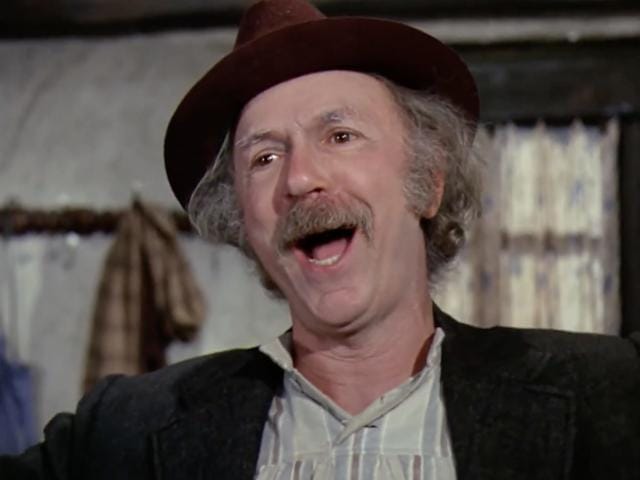
But right when you're thinking this not-so-old man has been laying on his ass, watching his daughter work her fingers to the bone in the laundry night after night, for too long, you also notice that the movie never questions his deep affection for his grandson. Every one of their interactions is sincere, playful and kind. There is not a molecule of sarcasm or annoyance between them: they love each other immensely. They're two peas in a pod (although Grandpa Joe is definitely more of a troublemaker than poor Charlie). This throughline of actual love between Grandpa Joe and Charlie is the rack that the whole movie hangs on.
Speaking of performances, all the child actors are outstanding. Of special note are Denise Marie Nickerson playing Violet Beauregarde and Julie Dawn Cole as Veruca Salt.
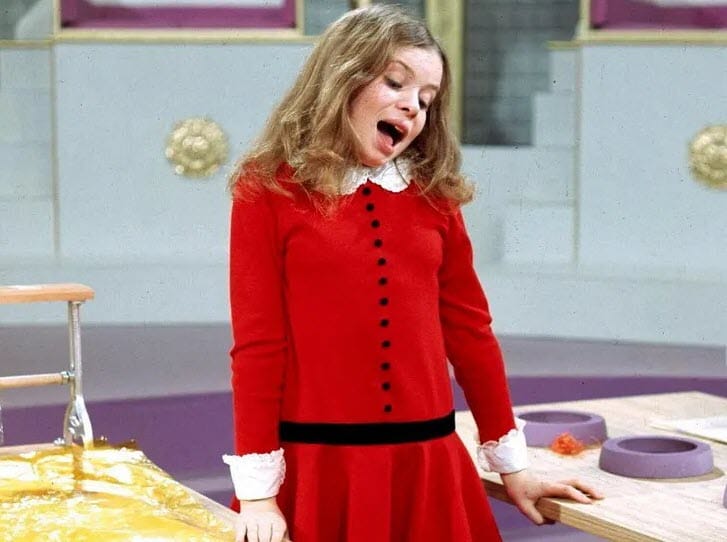
I can't believe that the powerhouse performance we get from Julie Dawn Cole was done when she was only 12 years old. Her hair-flipping, foot-stomping, fist-clenching spoiled brat is delivered with amazing control and timing. Does she know how FUNNY that performance is??
As an early elementary school kid I didn't really grasp a lot of abstract concepts like the poisons of greed, delusion, and hatred, and how harshly they corrupt the human mind. I could understand that Veruca Salt was whiny and loud, and that she was yelling at her dad to buy her everything she saw because she "wants it right now!" Even as a child this would have really annoyed me, but there is hidden brilliance in her character, especially in the lyrics of her song ("I Want It Now").
She starts by craving exactly what's in front of her eyes, then immediately names it as hers and puts demands upon it (she doesn't even have it yet!):
I want a golden goose/gooses, geeses
I want my goose to lay gold eggs for Easter/At least a hundred a day
Then she spins into more demands, this time for the pleasures of the table:
I want a feast/I want a bean feast!/ Cream buns and doughnuts and fruitcake with no nuts/ So good you could go nuts– No, now!
And finally, the verse that brings it home, even to a six year old, that she would consume and consume endlessly, that her craving would never be satisfied, that even getting what she wants would not calm her but just make her hungrier and hungrier for more:
I want the world/ I want the whole world/I want to lock it all up in my pocket/ It's my bar of chocolate/Give it to me now!/ I want today, I want tomorrow!/I want to wear 'em like braids in my hair and I don't want to share 'em!
This is a Roald Dahl book, after all, so the results of her karma are literal and swift, and Veruca is dumped down the trash chute to maybe be incinerated, or maybe not. Wonka plays it cool. The Oompa-Loompas on deck give us the lesson in plain text (literally), and say it right out loud: "Who's to blame? The mother and the father." Damn, tell em.
If you've read this far I know you're waiting for "Pure Imagination", so I've put it right here for you.
Pure Imagination.
It struck me on this most recent viewing that the construction of "Pure Imagination" is not only sweeping, beautiful and haunting; the introduction to the song is purposely disjointed and off-time. The delicate chimes in a minor key (it's a minor ninth, to be precise) play us into Wilder's thoughtful but thin and breathy singing, but he's not on beat. He just comes in, and the music has to catch up later. It does, in an orchestral rush, but it somehow stays restrained and never bursts out emotionally. His singing delivery is under his breath, as if this is a song just for himself.
The effect is unsettling and melancholy. We as viewers still don't know what to think. "Pure Imagination" has uplifting segments of hope and joy that fill your lungs, but there is always sadness underneath. Is this loneliness, or madness? The dichotomy makes the song hard to place firmly in "Happy" or "Sad", layering emotional depth over a scene that should be raucously upbeat (AN INFINITE CANDY ROOM!).
In just a few minutes of performance, Wonka is revealed to have more going on than just being totally goofy and fey. His philosophy and his background is revealed to the audience, but not the other characters, in his four minutes of music. Charles Cornell, music reviewer, calls 'Pure Imagination' "The most beautiful song ever written for film". [If you want to know more about the music theory of the construction of 'Pure Imagination', give that link a click!]
It also has one of the most unexpectedly Zen Buddhist lines I've heard in a musical: "If you want to view paradise, simply look around and view it." Happiness, and suffering, are born in your mind. The way you react to events is how you experience them. What if you could live freely, through your imagination?
We never see Charlie stand up to his Grandpa until the very end of the film. He always goes along with Grandpa Joe's influence, both good and bad. Charlie, pure in heart and honest in mind, resists the pull of Grandpa Joe's vengeful anger ("I'll get even with him if it's the last thing I ever do! If Slugworth wants a Gobstopper, he'll get one!") and returns the Gobstopper to Wonka– even though he has just been shouted at and called a loser.
This film takes this brief moment, what you could call Charlie's coming-of-age, when he listens to his own morals and makes his own decision, and layers a single sound over it: the ticking of the office clock. There is a pause, and a gentle close-up of Wonka's hand closing over the Gobstopper. Viewers might think of it only as a candy souvenir, but the movie built up this object as top-secret technology– the clandestine sale of which, to "Mr Slugworth", would probably have rescued Charlie's family from crushing poverty. But Charlie doesn't consider this out loud. He simply returns it. The quiet line spoken by Wonka in that moment are the words of Shakespeare.
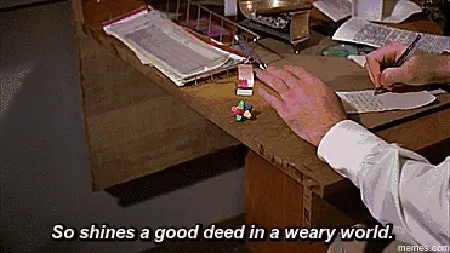
WILLY WONKA AND THE CHOCOLATE FACTORY was not well appreciated by Roald Dahl, may he rest in giant peaches, but it has been pure magic for generations of viewers. If you haven't seen it in a while, take it for a spin again. Some things (like the paddleboat scene) might just hit different once you've marinated in psychedelic media for a couple decades.
And try to take a breath. Count to three. Have you been swept away by anger or greed a little too much lately? What if you just let that feeling flow past you, like clouds across a mountain? What if you lived freely, happily, maybe in a deep-violet jacket? Imagine it.
Living there, you'll be free, if you truly wish to be...
Personal rating: 10/10: Influential, iconic, immortal magic.
This article was written by a real human without any use of AI.
